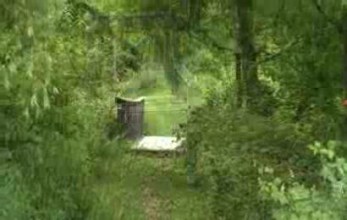Of all seasons, spring is the most dynamic, optimistic, and extroverted. The land emerges from winter in muddy shades of taupe and grey. Melting snow banks reveal cigarette butts and dog shit. Cyclists dodge pot holes and moraines of road gravel. Skinny animals eat leftovers from the previous year’s growing season. Then, as the sun stays up past supper, things change fast. Scouts gather litter and crews fix the streets. Colt’s foot appears at road sides. Birds sing in the pussy willows. Sap rises in maple trees and people.
This year I decided to celebrate the season with a silent retreat. I searched for a Pagan or Buddhist program that suited my schedule. Finding none, I took a chance on Loyola House, a retreat centre on the property of a century old Jesuit monastery in Guelph, Ontario. I am glad I did. For many readers, Catholicism is laden with heavy suitcases, but Loyola House has untethered itself from tradition. It is revolutionary and perhaps a model for a future Pagan centre.
Loyola House sits on 600 acres of hilly land in southern Ontario. Guided by principles of eco-theology, the Jesuits farm organically and manage their land sustainably. There are CSA plots, an organic fruit orchard, grain fields and pasture, bee hives, a sugar bush, old growth forest, and wetland. A brook runs next to an abandoned gravel quarry which the Jesuits are rehabilitating. The public is permitted to hike and ski on the trails that wind through the property.
the Jesuits farm organically and manage their land sustainably. There are CSA plots, an organic fruit orchard, grain fields and pasture, bee hives, a sugar bush, old growth forest, and wetland. A brook runs next to an abandoned gravel quarry which the Jesuits are rehabilitating. The public is permitted to hike and ski on the trails that wind through the property.
Loyola House itself is stereotypically monastic with a chapel, hall, simple rooms, and bracing showers. In the kitchen, a modern Friar Tuck prepares divine meals with local and home grown ingredients. There is a fireplace and plenty to read. House rules dictate that electronic devices be turned off but it’s okay to knit. On retreat, silence reigns until noon every day and then it is optional. I chose to undergo the full silent treatment. Retreatants attend chapel at intervals throughout the day and sing prayers mostly in Latin. I might as well have been chanting a Sanskrit sutra such was my understanding. I spent my free time hiking and meditating.
Next to Loyola House is an innovative outdoor garden of spiritual installations:
- A labyrinth patterned on the Chartres labyrinth, mown into native grasses.
- An outdoor Stations of the Cross installation that reimagines the earth as Jesus in the passion story. (Guess who the earth’s executioners are…yup… us.)
- A spiral galaxy “Stations of the Cosmos” installation with a fire pit at its centre representing the birth of the universe, the formation of our solar system, the emergence of life, and forks of evolution. Sadly, it culminates in the mass extinctions of our Anthropocene era.
- An exhibit outlining the basic ecological ethic of each of the world’s major religions including Paganism.
- A weathered cemetery lying under mature spruce trees.
- A peace pole with the slogan, “May peace prevail on earth” in many languages.
A trail following the creek leads to an Aboriginal sweat lodge. In addition, I found a “living” shelter woven from willow, hidden in a copse. Inside was a log pew for the weary spiritual seeker. Posted throughout the property are small signs bearing quotations from ecologists, First Nations leaders, and theologians such as Thomas Berry. There is much for a Pagan to explore.
As the retreat was ending, I spoke to the director of Loyola House, Paul Panaretos, a Detroit-born, Yale educated priest clad in polar fleece. He said that Loyola House is intentionally ecumenical, and wishes to attract spiritual seekers from all walks of life. With eco-spirituality at its core, the values of Loyola House are strikingly similar to those of other progressive faiths and philosophies. I lifted the following statement of values from the Loyola House website:
Rooted in the Catholic Christian tradition and building on the history of the Jesuit community in the Guelph area, we value:
- all creation

- compassion
- unity in diversity
- ecological sustainability
- interfaith connections
- social justice
- the spiritual journey
Sound familiar anyone?
Visiting Loyola House is easy. Anyone may explore the grounds. To register for a retreat, visit: ignatiusguelph.ca. The administrators ask applicants’ religion on registration forms. Not knowing what to expect, I put down “United,” my childhood religion. If I had written “atheist” or “Church of Ecstatic Nudity” I think they wouldn’t have cared. For the Lenten, silent retreat, people came from all over Ontario as well as Germany, British Columbia, and Buffalo, New York and from various faiths.
I left Guelph feeling profoundly peaceful, although I have relapsed to baseline neurosis since. I still feel gratitude for the retreat, Loyola House, and the Jesuits. The silent retreat was a deeply spiritual, Naturalistic Pagan way to celebrate the exuberance and hope of spring.
Renee Lehnen
 Renee Lehnen is a registered nurse and recent empty nester living in Stratford, Ontario, Canada. With her new found free time, she enjoys outdoor sports, working on local environmental projects, and gazing at the sky wondering, “What does all of this mean?”
Renee Lehnen is a registered nurse and recent empty nester living in Stratford, Ontario, Canada. With her new found free time, she enjoys outdoor sports, working on local environmental projects, and gazing at the sky wondering, “What does all of this mean?”
 Naturalistic Paganism
Naturalistic Paganism

